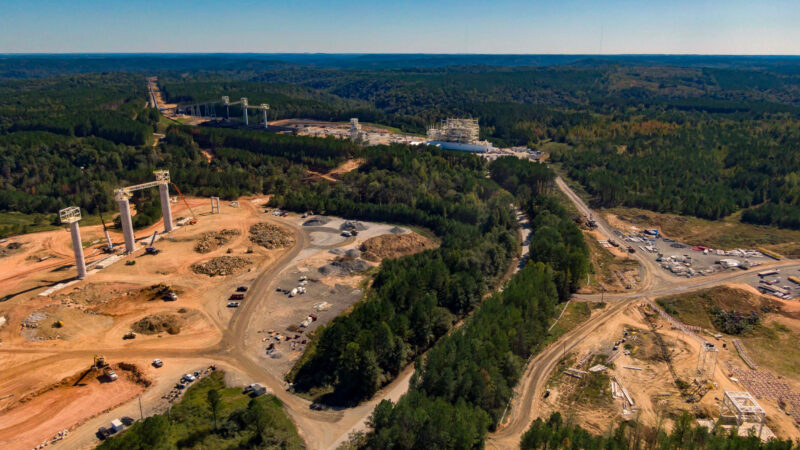Trump aims to fast track Alabama coal build-out, citing US need. Nearly all the coal is bound for export
Warrior Met’s Blue Creek mine expansion is set to be one of the largest coal infrastructure buildouts in Alabama history.
This article originally appeared on Inside Climate News, a nonprofit, independent news organization that covers climate, energy and the environment. It is republished with permission. Sign up for their newsletter here.
By Lee Hedgepeth, Inside Climate News
BROOKWOOD, Ala.—The Trump administration has announced it will aim to fast track the permitting and environmental review of a major coal mine expansion in central Alabama as part of a larger effort to accelerate the construction of what the government has labeled “critical mineral” infrastructure.
While administration officials said the change is aimed at “significantly reduc[ing] our reliance on foreign nations,” coal produced as part of Warrior Met’s expansion in Alabama is almost entirely exported overseas to support foreign steelmaking markets, according to the company.
Warrior Met’s Blue Creek mine expansion, set to be one of the largest coal build-outs in Alabama history, is one of 20 planned developments deemed “transparency projects” by the administration over the last two months. The mine expansion will be placed on the federal government’s permitting dashboard as it moves its way through the regulatory and permitting process.
The projects’ inclusion on the dashboard authorized under the 2015 Fixing America’s Surface Transportation Act (FAST) will, according to the Trump administration, “make the environmental review and authorizations schedule for these vital mineral production projects publicly available and allow all of these projects to benefit from increased transparency.
“The public nature of the dashboard ensures that all stakeholders, from project sponsors and community members to federal agency leaders have up-to-date accounting of where each project stands in the review process,” the administration said in its announcement. “This transparency leads to greater accountability, ensuring a more efficient process.”
During the Biden administration, the so-called FAST-41 dashboard was used to fast-track projects aimed at benefiting tribal nations, as well as various projects advancing renewable energy, coastal restoration, broadband and electricity transmission sectors. The program was created as a means “to enhance transparency and increase the efficiency of the permitting process,” the Biden administration said at the time. With a new president, though, the programs designated to participate in the program—and the policy priorities they represent—have now changed.
The Trump administration has already signaled its support of the Alabama project. In April, Interior Secretary Doug Burgum visited an existing Warrior Met mine outside Tuscaloosa and took a windshield tour of the Blue Creek facility currently under construction.
During that visit, Burgum emphasized the administration’s stated commitment to fossil fuel production and said that its actions would “unleash American energy.” He did not acknowledge Warrior Met’s checkered safety and environmental record or that nearly all of its product—metallurgical coal—is shipped overseas for foreign steelmaking operations, not used in the U.S.
“We sell substantially all of our steelmaking coal production to steel producers outside of the United States,” a recent Warrior Met corporate filing said. “For the three months ended March 31, 2025, our geographic customer mix was 37% in Europe, 43% in Asia, and 20% in South America.”
The planned expansion of Blue Creek involves a major build-out of Warrior Met’s ability to mine for underground coal using the longwall method, a particularly destructive form of mining in which large machines shear walls of coal, leaving vast, empty expanses in their wake. Land above those empty caverns sinks, causing what is often permanent damage to the surface and structures there.
Longwall mining has devastated communities in Alabama and beyond. In March 2024, an Alabama home exploded above a longwall mine with a different owner after methane—a gas released during mining—seeped into the residence and ignited. The resulting blast killed an Alabama grandfather and seriously injured his grandson. Since then, the community above the Oak Grove mine in western Jefferson County has continued to crumble, homes’ foundations cracking as the longwall mine expands below.

Earlier this year, just as President Donald Trump was announcing efforts to promote “clean, beautiful coal,” a West Virginia woman was hospitalized after a methane explosion in her home atop a longwall mine left her seriously injured. Workers from the mine beneath her home had stood behind Trump during his White House announcement.
Once completed, Warrior Met’s Blue Creek expansion will increase the company’s coal production by 60 percent, providing additional supply for overseas steelmaking markets hungry for met coal that can meet production needs. Taxpayer-funded support for the facility may top $400 million.
The company has also asked the federal government to allow it to mine publicly owned coal as part of the Blue Creek project. The federal Bureau of Land Management announced last year that it would conduct an environmental assessment related to Warrior Met’s Blue Creek project and, specifically, its proposal to mine 14,040 acres of federal minerals underlying privately owned land in Tuscaloosa County. Warrior Met’s applications to lease the coal rights propose the extraction of approximately 57.5 million tons of recoverable public coal reserves.
Initial government scoping documents indicated that any environmental assessment of the Blue Creek project would include an analysis of its impact on climate change, both direct and indirect. Since those initial documents were released, however, federal guidance on the inclusion of climate change considerations in government decision-making has been in flux.
A day one executive order by Trump, for example, disbanded the Interagency Working Group on the Social Cost of Greenhouse Gases (IWG), which was established pursuant to a Biden executive order. The order said “any guidance, instruction, recommendation, or document issued by the IWG is withdrawn as no longer representative of governmental policy.”
That guidance had emphasized the importance of government analysis of the social cost of carbon, a way of putting a dollar figure on the economic damage that comes from emitting a ton of carbon dioxide. The Trump White House has said without evidence that the concept “is marked by logical deficiencies, a poor basis in empirical science, politicization, and the absence of a foundation in legislation.”
Public comments on the project already submitted to BLM included concerns around greenhouse gas emissions and Warrior Met’s contribution to the climate crisis.
“Please do not approve any new or expanded coal mining,” one commenter wrote. “The climate crisis is already deadly and rapidly getting worse. There is an overwhelming international consensus on the severity of this crisis and the urgent need to phase out the use of harmful fossil fuels.”
The draft environmental impact statement for the Blue Creek project, originally set to be released sometime in the fall, is now scheduled to be published on May 30, according to BLM.
In addition to the Blue Creek mine expansion, the Trump administration has added the following projects to the FAST-41 program:
- Resolution Copper Project
- Stibnite Gold Project
- McDermitt Exploration Project
- South West Arkansas Project
- Caldwell Canyon Mine Project
- Libby Exploration Project
- Lisbon Valley Copper Project
- Silver Peak Lithium Mine
- Michigan Potash
- NorthMet
- La Jara Mesa
- Roca Honda
- Greens Creek Surface Exploration
- Stillwater Mine
- Polaris Mine
- Becky’s Mine Modification
- 3PL Railroad Valley Exploration
- Grassy Mountain Mine
- Amelia A&B
Russian strikes knock out heat in freezing Kyiv as peace talks continue
Russian strikes left much of Kyiv without heat, water and power during freezing temperature, even as Ukraine, Russia and the U.S. held talks on ending the nearly four-year war.
Man shot dead by federal immigration officers in Minneapolis
The incident, which was caught on video, marks the second deadly shooting by federal officers in Minneapolis in less than a month.
Heavy snow and rainfall kill 61, injure 110 over 3 days in Afghanistan
Dozens were killed and hundreds homes destroyed, according to the country's disaster management authority, in storms impacting 15 of Afghanistan's 34 provinces.
China’s top general under investigation in latest military purge
Analysts believe these purges aim to reform the military and ensure loyalty to Chinese leader Xi Jinping. Another commission member, Liu Zhenli, is also under investigation.
This sprawling, surrealist movie is a tribute to cinema itself
Director Bi Gan, known for his films Kaili Blues and Long Day's Journey Into Night, sets his latest film in a world where people can live forever, unless they dream.
As the winter storm rages, here’s what to know in your state
Reporters across the NPR Network are covering the impact of the storm and how officials are responding. We've also got tips for staying safe once bad weather hits.






